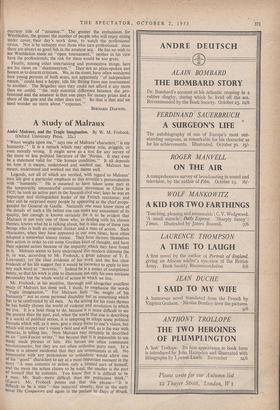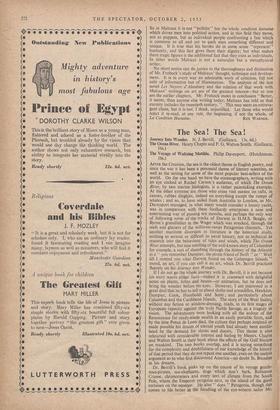A Study of Malraux
Andre Malraux, and the Tragic Imagination. By W. M. Frohock. (Oxford University Press. 32s.) Andre Malraux, and the Tragic Imagination. By W. M. Frohock. (Oxford University Press. 32s.) "WHAT weighs upon me," says one of Malraux' characters," is my humanity." It is a remark which may appear trite, priggish, or even morally wrong. It might serve as a text for any survey of the more or less political literature of the 'thirties. It may even be a statement valid for "the human condition." It all depends on how it is meant, understood and worked out. Malraux has meant, understood and worked out this theme well.
Legends, not all of which are verified, with regard to Malraux' own life give a particular emphasis to this novelist's preoccupation with "humanity." He is assumed to have taken. some part in the temporarily unsuccessful communist movement in China in 1925; he took an active part in the Spanish civil war; later he was an important and distinguished leader of the French resistance; and later still he surprised many people by appearing as the chief propa- gandist for General de Gaulle. Naturally one must know more of the details of such a life before one can make any assessment of its i quality, but enough is known certainly for it to be evident that Malraux is not only, one of those who, in dealing with his chosen themes, knows what he is talking about, but is also one of those rare beings who is both an original thinker and a man of action. Such characters, when they have appeared in our own times, have often adopted a somewhat uneasy stance. They. have thrown themselves into action in order to cut some Gordian knot of thought, and have then rejected action because of the impurity which they have found in it. Malraux seems to have understood this modern dilemma (he is, or was, according to Mr. Frohock, a great admirer of T. E. Lawrence), yet the clear evidence of his work and the less clear evidene of his life suggest that it would be incorrect to apply to him any such word as "neurotic." Indeed he is a writer of exceptional sanity, so that his work is able to illuminate not only his own intricate personality but the whole world of action in which we live.
Mr. Frohock, in his sensitive, thorough and altogether excellent study of Malraux has done well, I think, to emphasise the words "tragic imagination." For Malraux feels "the weight of his humanity" not as some personal disability but as something which has to be confronted by all men. As the setting for his main themes he has boldly chosen the world of violence is revolution in which i we live. It is a bold thing to do, because it s more difficult to see the present than the past, and, when the world that one is describing is a world of political action, it is tempting to adopt some political formula which will, as it were, give a sharp focus to one's vision, but which will restrict one's vision's field and will end, as is the way with cameras, in telling lies. Now Malraux may certainly be described as an "anti-Fascist writer," but beyond that it is impossible to use ready made phrases of him. His heroes are often communist revolutionaries, but they are not often orthodox party men, In a sense it is almost incidental that they are communists at all. No communist with any pretensions to orthodoxy would allow one of his "good" dharacters to say at a most important moment in the story "A man commits to action only a limited part of himself, and the more the action claims to be total, the smaller is the part of himself that he commits. You know that it is difficult to be a man, Mr. Scali—more difficult than .the politicians think." (Espoir). Mr. Frohock points out that this phrase—"It is difficult to be a man"—has occurred already, first in the early novel The Conquerors and again in the preface to Days of Wrath. So in Malraux it is not "politics" but the whole condition humaine which drives men into political action, and in this field they move,
not as puppets, but as individual people confronting a fate which is common to all and yet to Each man something different and unique. It is true that his heroes do in some sense "represent" humanity, and this fact gives them their dignity; but what makes them tragic figures is the additional fact that they exist as individuals. In other words Malraux is not a naturalist but a metaphysical writer.
No short notice can do justice to the thoroughness and distinction of Mr. Frohock's study of Malraux' thought, technique and develop- ment. It is in every way an admirable work of criticism, full not only of information but of illumination. The analysis of the last novel Les Noyers d'Altenburg and the relation of that work with Malraux' writings on art are of the greatest interest—but so too are the eailier chapters. Mr. Frohock states in conclusion "Better, it seems, than anyone else writing today, Malraux has told us that eternity includes the twentieth century." This may seem an extrava- gant claim, but it is not, I think, unjustified. Let those who would reject it re-read, at any rate, the beginning, if not the whole, of



















































 Previous page
Previous page